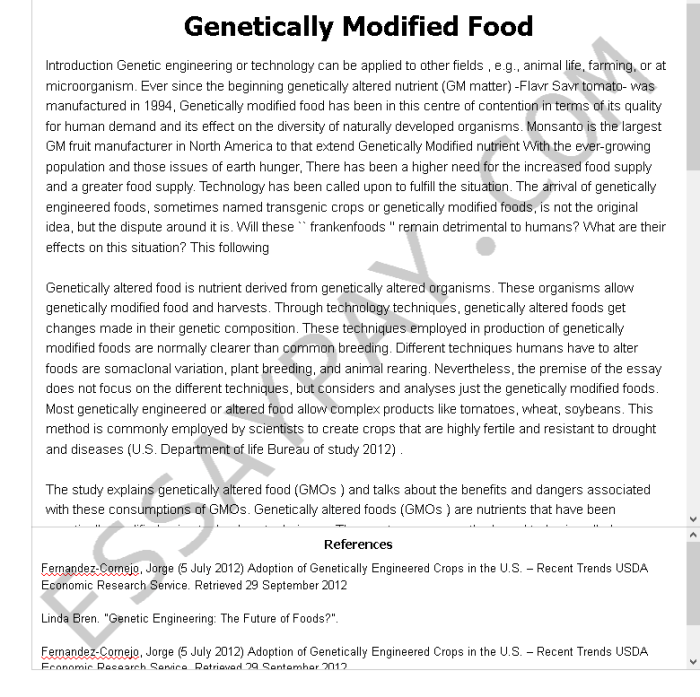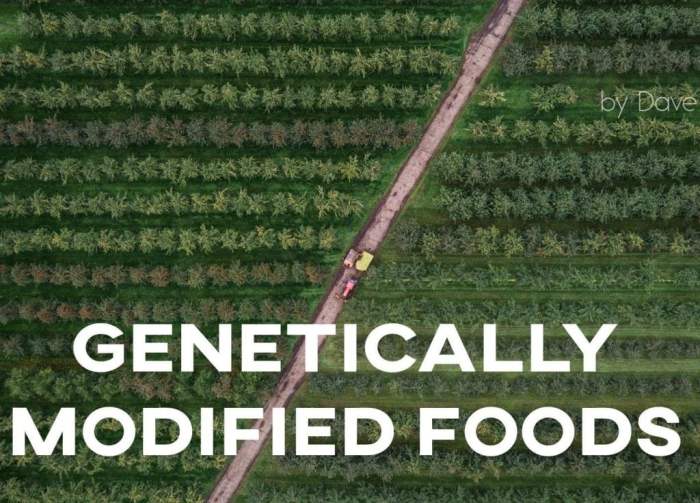Argumentative essay on genetically modified foods – Delving into the complex and multifaceted topic of genetically modified foods (GMOs), this essay presents a comprehensive analysis of their potential benefits, concerns, and ethical and social implications. Exploring the scientific, environmental, and societal dimensions of GMOs, this argumentative essay aims to provide a balanced and informed perspective on this highly debated issue.
Genetically modified foods have emerged as a significant development in modern agriculture, promising to address global food security challenges and improve nutritional outcomes. However, concerns about their potential environmental and health impacts have also sparked ongoing debates. This essay examines both sides of the argument, presenting evidence-based insights and critical analysis to inform readers’ understanding of this complex topic.
Genetically Modified Foods: Benefits, Concerns, and Ethical Implications

Genetically modified foods (GMOs) have sparked widespread debate due to their potential benefits and concerns. This essay aims to examine the arguments surrounding GMOs, exploring their advantages, potential risks, and the ethical and social implications associated with their use.
The thesis of this essay is that while GMOs offer promising benefits in terms of increased crop yield and nutritional value, concerns regarding environmental risks, health impacts, and ethical considerations necessitate a cautious and evidence-based approach to their development and regulation.
Benefits of GMOs
GMOs have the potential to significantly increase crop yield, ensuring a more sustainable food supply for a growing population. By modifying genes, scientists can enhance crop resistance to pests and diseases, reducing the need for chemical pesticides and herbicides. Additionally, GMOs can be engineered to improve nutritional value, providing essential vitamins and minerals that are often lacking in conventional crops.
For instance, Golden Rice, a GMO variety, has been developed to contain high levels of beta-carotene, a precursor to vitamin A. This has the potential to address vitamin A deficiency, a major public health concern in developing countries.
Concerns about GMOs
Despite their potential benefits, GMOs have raised concerns about their impact on the environment and human health. Environmental risks include the potential for GMOs to cross-pollinate with wild relatives, introducing foreign genes into natural ecosystems. This could disrupt biodiversity and lead to the development of herbicide-resistant weeds.
Health concerns stem from the possibility of allergic reactions or other adverse effects due to the consumption of GMOs. While there is no conclusive evidence of harm to date, some studies have raised questions about the long-term safety of certain GMOs.
Ethical and Social Implications, Argumentative essay on genetically modified foods
The use of GMOs also raises ethical and social considerations. Concerns include the potential for genetic engineering to alter the natural order of things and the impact on biodiversity. Social implications include the potential impact on farmers, consumers, and the food industry.
Small-scale farmers may face challenges in accessing and using GMO seeds, while consumers may have concerns about the transparency and labeling of GMO products. The food industry must also adapt to the challenges and opportunities presented by GMOs.
Regulation and Policy
The regulation of GMOs is complex and varies across different countries. Regulatory frameworks aim to ensure the safety and environmental sustainability of GMOs. However, there are ongoing debates about the adequacy of current regulations and the need for further research.
Some countries have adopted a precautionary approach, requiring rigorous safety assessments before approving GMOs for commercial use. Others have taken a more permissive approach, allowing GMOs to enter the market with less stringent oversight.
Expert Answers: Argumentative Essay On Genetically Modified Foods
What are genetically modified foods (GMOs)?
Genetically modified foods (GMOs) are foods derived from organisms whose genetic material (DNA) has been altered using genetic engineering techniques. These techniques allow scientists to introduce new traits or modify existing ones in plants, animals, or microorganisms.
What are the potential benefits of GMOs?
GMOs have the potential to offer several benefits, including increased crop yield, enhanced nutritional value, resistance to pests and diseases, and improved tolerance to environmental stresses. These benefits can contribute to increased food production, improved food security, and reduced environmental impact.
What are the concerns about GMOs?
Concerns about GMOs primarily focus on their potential environmental and health impacts. Some concerns include the potential for gene flow to wild populations, the development of herbicide-resistant weeds, and the potential for allergic reactions or other health effects in humans or animals consuming GMOs.
How are GMOs regulated?
GMOs are subject to various regulatory frameworks around the world. Regulatory agencies assess the safety of GMOs before they are approved for commercial use, considering factors such as their potential environmental and health impacts. The regulatory process involves scientific risk assessments, field trials, and monitoring.
